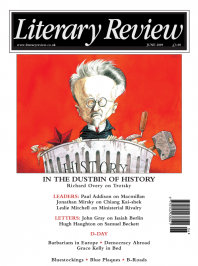Elspeth Barker
The Little Owl
Lavinia
By Ursula K Le Guin
Gollancz 295pp £14.99
Virgil’s women are fabulous, both literally and colloquially. Throughout the Aeneid, they bring about confusion, high drama, tenderness and tragedy, a shining counterpoint and interruption to the background of war and travail, past, present and to come, and the immutable forces of destiny which of course engulf them too, struggle as they may to thwart them. In the earlier books we encounter Venus, on one occasion clad in high scarlet leather boots, ghostly Creusa, and towering, tragic Dido; later come the enchantress Circe, Camilla the warrior princess, so fleet of foot that she can pass through a cornfield and not disturb a single blade, assorted Nereids, nurses, mothers, and female personifications of vileness. And in that throng someone scarcely visible, Lavinia, in the words of the great Gilbert Highet, ‘a quiet, dutiful, passive little girl’.
This is Ursula K Le Guin’s heartfelt offering to Virgil, a munus in the Roman tradition of a gift to the honoured dead. She has dispensed with ‘the literary machinery of the Pantheon’, and using Virgil as her guide to the setting and events has brought Lavinia out

Sign Up to our newsletter
Receive free articles, highlights from the archive, news, details of prizes, and much more.@Lit_Review
Follow Literary Review on Twitter
Twitter Feed
Russia’s recent efforts to destabilise the Baltic states have increased enthusiasm for the EU in these places. With Euroscepticism growing in countries like France and Germany, @owenmatth wonders whether Europe’s salvation will come from its periphery.
Owen Matthews - Sea of Troubles
Owen Matthews: Sea of Troubles - Baltic: The Future of Europe by Oliver Moody
literaryreview.co.uk
Many laptop workers will find Vincenzo Latronico’s PERFECTION sends shivers of uncomfortable recognition down their spine. I wrote about why for @Lit_Review
https://literaryreview.co.uk/hashtag-living
An insightful review by @DanielB89913888 of In Covid’s Wake (Macedo & Lee, @PrincetonUPress).
Paraphrasing: left-leaning authors critique the Covid response using right-wing arguments. A fascinating read.
via @Lit_Review